Let’s face it, simply having social media accounts is no longer sufficient. Okay, you have accounts, but are they really working for you, or do they just exist? With trends changing at such a fast pace and customer behavior always evolving, it is hard to keep up, let alone be ahead of the curve.
So, how does one stay relevant in such a dynamic world? How do you ensure that your efforts will result in real engagement and lasting connections?
Top Social Media Trends for 2025:
AI as a TOOL
TIP: Use AI for content ideas and analytics, but write your own captions.Build communities
TIP: Start a weekly series or live sessions.Short-form videos
TIP: Always use hooks when you can, grab attention as soon as possible. pic.twitter.com/Kpu71M6EWW— Go Be Social Media (@gobesocialmedia) January 14, 2025
The key to this lies in taking a step back and doing a proper social media audit. It’s your opportunity to take a hard look at your social media presence and see exactly where you stand, where you need to improve, and how to improve it in a manner that truly reaches your audience.
What is a Social Media Audit?
A social media audit is a thorough assessment of your social media accounts across all platforms, aiming to evaluate performance, identify areas for improvement, and verify that your approach is in line with your company objectives. It entails assessing important data such as engagement and content reach to evaluate what is working and requires improvement.
For example, consider a small café. An audit reveals that while their Facebook page generates high engagement through user reviews and posts, their Instagram account does not perform as well. The café might then change its strategy, switching to more engaging formats such as Instagram Reels or Stories, which create more engagement than traditional photo posts.
The café gains data on which types of posts resonate the most and where their efforts should be focused, enabling it to deploy resources better and connect with its audience.
Step-by-step Guide to Conducting a Social Media Audit
Even if you intend to hire a professional agency to perform your social media audit, knowing how it works can help you set more defined goals and interpret the results more accurately. By knowing these steps, you will not only appreciate the effort that goes into it but also understand aspects of your strategy that may need modification.
Before diving into the process, using Andava’s social media audit checklist can help ensure you systematically assess key metrics, engagement levels, and content effectiveness across all platforms.
1. Define the Goals of the Audit
Before you get into a social media audit, clearly understand your reasons for conducting the audit. Are you hoping to boost your social media presence? Is your goal to increase brand awareness? Or do you intend to expand your business network using social media for B2B marketing? This way, you get to focus on only the most important things to help achieve your goal.
2. List All Your Social Media Accounts
A social media audit should consider your presence across different social media platforms. So, after getting a clear idea of what you want, make a list of all the social media accounts your brand runs. By examining all of them, you can gain various insights such as how a campaign on one platform can have a ripple effect across other platforms.
3. Check for Brand Consistency
 To build trust and recognition, ensure your brand maintains the same core identity across all platforms. Most social media apps have varying requirements when it comes to content style or format, but you can still preserve your brand’s distinct image and voice. Make sure you maintain consistent visuals, tone, and messaging. Consistency paints your brand as reliable no matter where customers encounter it.
To build trust and recognition, ensure your brand maintains the same core identity across all platforms. Most social media apps have varying requirements when it comes to content style or format, but you can still preserve your brand’s distinct image and voice. Make sure you maintain consistent visuals, tone, and messaging. Consistency paints your brand as reliable no matter where customers encounter it.
4. Analyze Your Metrics
Consider metrics such as followers and growth rate, likes comments, reach, and impressions on your posts. Simply explore the analytics dashboards provided by each platform. For instance, Instagram Insights, Facebook’s Meta Business Suite, and YouTube Studio offer data on reach, engagement, and follower demographics.
For more advanced analysis, you can use social media analytics tools like Sprout Social and Hootsuite Analytics. These tools help compare your metrics to industry benchmarks and analyze engagement to refine your strategy. Furthermore, tools like Socialbakers and Buffer Analyze provide features such as content optimization, audience tracking, and performance predictions to help improve your social media presence.
5. Assess Audience Engagement
A good engagement rate varies by platform and industry. On Instagram, for instance, an average engagement rate of 1% to 5% is considered good enough depending on the industry. Meanwhile, on LinkedIn, an engagement rate of 1% to 3.5% is considered as a good engagement rate.
Analyzing these benchmarks can help you determine whether your campaigns are performing well or if adjustments are needed for maximum impact. For instance, if your post gets 1,000 views with an engagement rate of only 0.5%, this may indicate a need for more compelling content or a better marketing strategy.
6. Evaluate Content Strategy
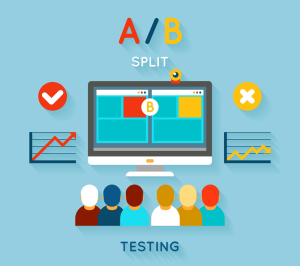 To identify what strategy works best for your brand, review your content and find its weak points. You can do a comparative analysis such as A/B testing of different content types or formats and analyze their performance to learn what resonates with your audience.
To identify what strategy works best for your brand, review your content and find its weak points. You can do a comparative analysis such as A/B testing of different content types or formats and analyze their performance to learn what resonates with your audience.
For example, experiment with different headlines, visuals, and call-to-action buttons to find out which one generates the most engagement. Sentiment analysis is another effective method for determining how your audience reacts to various content tones or themes.
7. Compare Performance Across Platforms
Each social media channel has distinct algorithms and audience behaviors that impact engagement. For example, according to recent studies, Facebook and YouTube tend to lead in engagement due to their highly visual content and active user base.
Your audit should identify which channels drive the most interaction and engagement for your brand. From there, you can focus on enhancing performance on platforms with lower engagement or consider putting more effort into channels with more growth potential.
8. Identify Areas for Improvement
Review data on engagement metrics such as follower counts, likes, shares, retweets, and comments to identify platforms with low interaction. Also, analyze business metrics like website traffic, conversion rates, and revenue per platform. These are the most essential, as you want to make sure your social media efforts result in business growth.
Then, examine the data to find the areas that need improvement. If X yields the most conversions, then increase your efforts on that platform. If your content on one platform isn’t resonating, experiment with different types of posts, like behind-the-scenes content. Set KPIs for these improvements, such as generating 50 more website visits in the next month from LinkedIn.
Managing social media marketing is A LOT!
Especially when you have to keep up with multiple platforms.
How do you make sure each channel stays healthy and productive?
You use this 6-step social media audit and template, for starters.https://t.co/thWH8yn5FX pic.twitter.com/DvdFj4QPXg
— WordStream by LocaliQ (@WordStream) August 22, 2024
The Best Social Media Audit Report Templates
An audit template is a unified document where you can record all your findings during an audit in an organized manner, so you create clear and strategic plans to optimize your social media strategy. The organization is important when conducting an audit because, without it, all you have is a load of data that you can’t do anything with.
There are different social media audit templates available to you as a brand owner. These templates may focus on different metrics, so it’s up to you to choose a template that offers exactly what you are looking for.
Andava Digital’s Social Media Template
Andava Digital’s social media audit template is a powerful tool designed to help you create a winning strategy that sets your brand apart from competitors. It identifies weaknesses in your current approach to social media marketing and helps you develop a clear actionable plan to improve your performance in all important areas. This template offers everything you need to improve your numbers and get results.
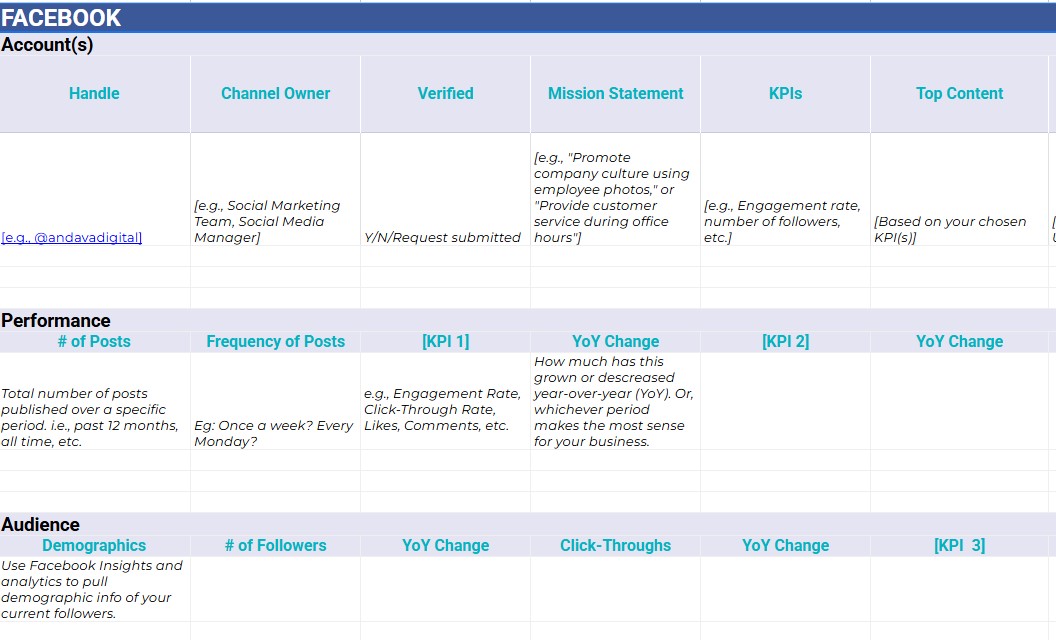
Taking Andava Digital’s expertise in SEO and social media marketing services into consideration, this template is ideal if you are looking to improve your overall brand strategy.
Download Andava Digital’s social media template today to start making data-driven decisions and open up growth opportunities for your business.
HubSpot’s Social Media Report Template
HubSpot’s template covers all the key aspects of a social media audit. It focuses on the most important engagement metrics like follower growth, engagement, and post reach. You can get detailed information to help your business by recording your monthly wins, opportunities, key initiatives, and your goals across platforms. Additionally, it takes a monthly snapshot of your accounts across all platforms to show your projections for the month and also how well your strategy is working.
Sprout Social’s Social Media Audit Template
This template allows you to go in-depth into the stats of each of your social media profiles. It features sections for assessing engagement rates, content types, and audience growth. Sprout Social also takes over-the-year metrics into account and monitors percentage changes to help you create an effective strategy for your brand.
Hootsuite’s Social Media Audit Template
Hootsuite’s template makes the audit process easier by giving a clear, step-by-step path to evaluating your social media performance. It allows you to track critical data such as engagement rates, follower growth, and content reach, and link them with your business objectives. The template also includes customizable sections for evaluating the success of your present content strategy, identifying gaps in your social media presence, and comparing your performance to competitors.
Asana’s Social Media Audit Template
Asana’s template focuses on the most important metrics that bring traffic to your accounts across all platforms. Its main focus is on details such as posting frequency, engagement, and followers. This helps you study the behavioral patterns of your followers so you can craft a better strategy taking that into account.
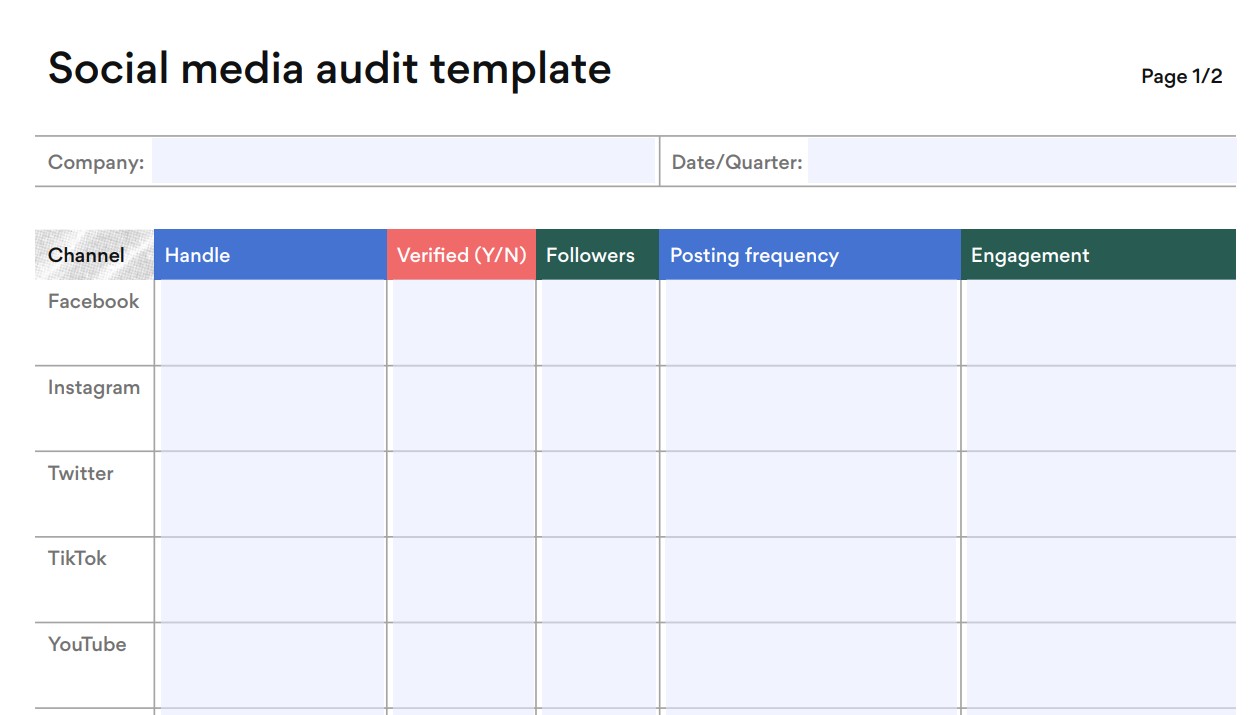
Social Media Audit Tools
Analyzing metrics manually could be very hard and you may not gain enough information to improve your strategy. Luckily, social media audit tools provide a solution. These tools offer detailed analysis using your metrics and give insights you wouldn’t spot on your own.
Google Analytics
Google Analytics is as good as it gets when it comes to social media management tools. It helps you track website traffic and conversations from your social media platforms. If you need extra information about your audience’s interaction with your social media and how it helps drive traffic, Google Analytics offers that.
Pros
- Completely free to use.
- It offers detailed traffic insights.
- Group your audience into different demographics.
Cons
- Takes time to learn how to use it.
- Has limited data retention.
Pricing
Google Analytics 360, which is the enterprise version, is billed at $150,000 per year.
Hootsuite
Hootsuite is a popular management tool that helps you create reports that show what impact social media has on your brand. You get actionable insights into which platforms, content types, and strategies are driving the most engagement and conversions, allowing you to optimize your efforts for better results.
Pros
- Hootsuite offers comprehensive social media management.
- It is easy to use and navigate.
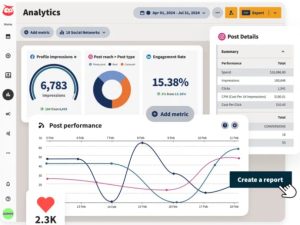
Cons
- It doesn’t have a free version.
- Not budget-friendly.
Pricing
The Professional plan from Hootsuite costs $99 per month, while the Team plan costs $249 per month. The Enterprise plan is custom-priced for large social media needs.
Sprout Social
Sprout Social is a social media management platform that analyzes how your audience interacts with your social media accounts across all platforms. It enhances the effectiveness of your strategy by providing minute, critical pieces of information to aid your decisions.
Pros
- Reports are easy to read and understand.
- It shows in-depth analytics.
- Helps with more effective post-scheduling.
Cons
- More expensive compared to other social media management platforms.
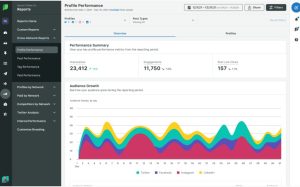
Pricing
Plans start at $249/month (Standard), $399/month (Professional), and $499/month (Advanced). There is an Enterprise plan, too, with custom pricing for large teams or organizations. The price is billed annually, with monthly billing available at a higher rate.
Rival IQ
Rival IQ specializes in social media marketing and analytics alongside competitive analysis. This makes it the perfect choice if you’re looking to gauge your performance against competitors and see how you can improve.
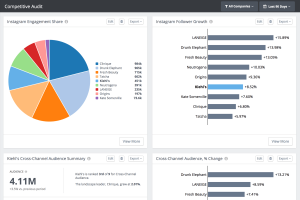
Pros
- Detailed performance reports.
- Free trial period.
Cons
- It is not budget-friendly.
Pricing
Pricing starts at $239/month for the Professional plan, $329/month for the Enterprise plan, and $499/month for the Advanced plan, all billed annually
Talkwalker
Talkwalker’s main focus is on identifying trends and using them to optimize social media strategy. It also offers comparative analysis services which let you compare your performance to your competitors and also to industry standards.
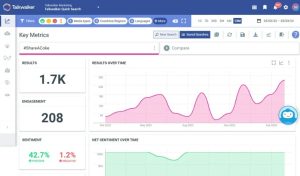
Pros
- Helps users navigate consumer data with social listening features.
- Provides AI-powered insight.
Cons
- Talkwalker’s services are not free to use.
- It has a complex interface.
Pricing
Pricing for Talkwalker starts at $9,600/year for its entry-level plan. Advanced plans with more features require custom quotes.
The Benefits of a Social Media Audit
A social media audit evaluates your present performance to pinpoint your strategy’s strengths and shortcomings. It offers insights into audience behavior and the platforms that generate the greatest interaction.

This data allows you to optimize your content to engage your audience and support your brand goals. You can prioritize the right channels and customize your messaging for maximum impact. Essentially, you gain clarity that keeps you focused on activities that yield quantifiable results.
Lastly, frequent audits will help you maintain your brand’s relevance and position it for long-term success because they ensure the strategy is in line with current trends. The easiest and most effective way to do this is to leverage specialized service providers who can create personalized strategies to help improve your performance.
At Andava Digital Marketing Agency, we specialize in social media marketing services that are designed to solidify your online presence, drive your business’s growth, and enhance engagement.